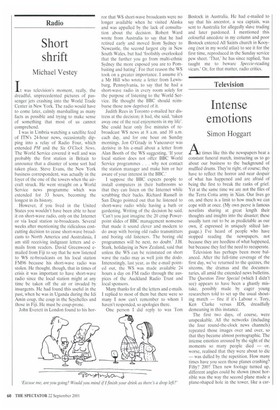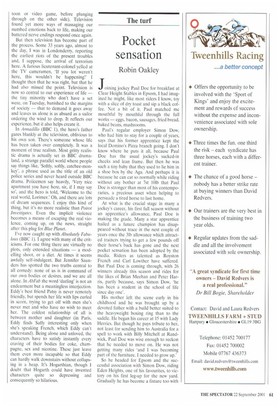Television
Intense emotions
Simon Hoggart
Atimes like this the newspapers beat a constant funeral march, instructing us to go about our business to the background of muffled drums. They're right, of course; they have to reflect the horror and near despair of what has happened and are afraid of being the first to break the ranks of grief. Yet at the same time we are not the files of the Terra Cotta army in Xian. Our lives go on, and there is a limit to how much we can cope with at once. (My own peeve is famous novelists sharing at great length their thoughts and insights into the disaster; these usually turn out to be as predictable as our own, if expressed in uniquely stilted language.) I've heard of people who have stopped reading the newspapers, not because they are heedless of what happened, but because they feel the need to recuperate.
Television has perhaps been more balanced. After the full-time coverage of the first day, we've returned to the quizzes, the sitcoms, the dramas and the documentaries, all amid the extended news bulletins. The Question Time Special (which I didn't see) appears to have been a ghastly mistake, possibly made by eager young researchers told to set up the usual shouting match — fine if it's Labour v. Tory, Ken Clarke versus IDS, dreadfully demeaning in this instance.
The first two days, of course, were unspeakable. All the networks (including the four round-the-clock news channels) repeated those images over and over, so that they became almost pornographic. The intense emotion aroused by the sight of the moments so many people died — or, worse, realised that they were about to die — was dulled by the repetition. How many times have you seen those planes crashing? Fifty? 200? Then new footage turned up, different angles could be shown (most horrible was the way the second plane made a plane-shaped hole in the tower, like a car toon or video game, before plunging through on the other side). Television found yet more ways of massaging our numbed emotions back to life, making our battered nerve endings respond once again.
But then television has become part of the process. Some 33 years ago, almost to the day, I was in Londonderry, reporting the earliest riots of the present troubles and, I suppose, the arrival of terrorism here. A furious lieutenant-colonel yelled at the TV cameramen, 'If you lot weren't here, this wouldn't be happening!' I thought then that he was right, but that he had also missed the point. Television is now so central to our experience of life — the tiny minority who don't have a set were, on Tuesday, banished to the margins of society — that to demand it goes away and leaves us alone is as absurd as a sailor ordering the wind to drop. It reflects our experience, but it also helps create it.
In Armadillo (BBC 1), the hero's father gazes blankly at the television, oblivious to his own son. There's someone whose life has been taken over completely. It was a moment of true realism. Most gritty realistic drama is actually set in BBC dramaland, a strange parallel world where people say things like, 'Softly, softly, catchee-monkey', a phrase used as the title of an old police series and never heard outside BBC drama. Policemen say heavily, 'Very nice apartment you have here, sir, if I may say so', and the hero is told, 'Welcome to the real world, Lorimer.' Oh, and there are lots of dream sequences. I enjoy this kind of thing, but it's no more realistic than Poirot Investigates. Even the implicit violence becomes a means of escaping the real violence, coming up, on the news, straight after this plug for Blue Planet.
I've now caught up with Absolutely Fabulous (BBC 1). I agree with many of the criticisms. For one thing there are virtually no plots, only extended situations — a modelling shoot, or a diet. At times it seems awfully self-indulgent. But Jennifer Saunders has spotted the two truths central to all comedy: none of us is in command of our own bodies or desires, and we are all alone. In AbFab the word 'darling' is not an endearment but a meaningless interjection. Eddy's best friend Patsy is never remotely friendly, but spends her life with lips curled in scorn, trying to get off with men she's never met and who have no wish to meet her. The coldest relationship of all is between mother and daughter (in Paris. Eddy finds Saffy interesting only when she's speaking French, which Eddy can't understand). Being alone and unloved, the characters have to satisf-y instantly every craving of their bodies for coke, champagne, sex and nicotine. These just leave them even more incapable so that Eddy can hardly walk downstairs without collapsing in a heap. It's Hogarthian, though I doubt that Hogarth could have invented characters quite so depressing and consequently so hilarious.











































































 Previous page
Previous page